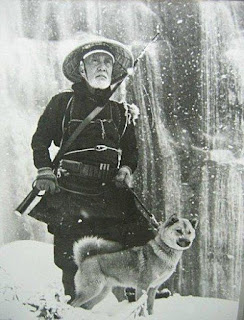Obscure Japanese Film #3
A film from 1982 about
an old hunter trying to kill an especially large and vicious black bear sounds
likely to be another schlocky Jaws
rip-off in the manner of Grizzly
(1976). However, the story actually owes more to Moby-Dick in that Heizo, the hunter in question, was attacked by
the bear some years previously and left with a bad facial scar as a result. As
played by Ko Nishimura, he seems too level-headed to seek revenge on an animal
for this reason alone, but further motivation is provided as the film
progresses. One of the many surprising things about The Old Bear Hunter is that the thinness of the plot turns out to
be something of an asset, providing a decent enough excuse for a film which is
as much a fascinating portrait of the little-known matagi as it is an adventure movie.
The matagi, traditional hunters often
accompanied by specially-trained Akita dogs, have been active in northern
Honshu for over 400 years hunting bear and other game. They consider these as gifts
from the mountain gods, and are careful not to waste any part of the animal or kill
more than they need.
The film opens with a
sequence on a snow-covered mountainside in which a bear is shot dead and the
hide removed. This appears to have been done for real, and The Old Bear Hunter is certainly a problematic film for animal
lovers. As in the case of the kangaroo hunt in the Australian film Wake in Fright, the filmmakers perhaps attempted to justify this scene by saying that the hunt was not staged
specifically for them, and they simply received permission to film a hunt that
was going to happen anyway. In any case, it certainly lends the picture a
remarkable degree of authenticity. Even more uncomfortable to watch are the
scenes of Heizo training his Akita – he slashes at it with a bear claw,
force-feeds it bear meat smeared with big dollops of bear fat, and even dons an
entire bear hide before attacking the hapless dog. Worse still, there is a
sequence featuring a matagi
dog-training competition in which a number of Akita are forced to attack a
chained bear. This scene goes on for some time and there is clearly no fakery
involved. However, if one can get past the brutality of these sequences, this
is a thoroughly absorbing and extremely well-made film.
This is also a film which
shows, rather than tells, and is therefore light on dialogue, something which
works very much in its favour. Director Toshio Goto makes full use of his
snow-laden, mountainous locations to often breathtaking effect, and the fact
that nothing appears to have been shot in a studio lends a sense of
documentary-like realism, while the esoteric details about bear bile, etc, suggest
that the ways of the matagi were
thoroughly researched in advance. Goto also skillfully manages to avoid lapsing
into melodrama and, when the climactic battle between old man and bear finally
arrives, it’s not only entirely convincing, but steers well clear of the sense
of triumphant revenge found in many ‘bad animal’ movies.
The Old Bear Hunter was Goto’s first film as director. Born in 1938, he
worked as an assistant director under Satsuo Yamamoto in the ‘70s. On IMDb, his
filmography has been mistakenly merged with another Toshio Goto who worked as
an editor on some of Kurosawa’s early films. However, the fact that he
subsequently made a Russian-Japanese co-production set in the wilderness of
Sibera entitled Pod Severnym
Siyaniyem / Under Aurora
immediately brings to mind Kurosawa’s 1975 film Dersu Uzala.
As Heizo, the diminutive Ko Nishimura is miscast in a role
that would have been better suited to a more physically powerful actor such as Toshiro
Mifune (perhaps Mifune turned it down). Considering this, he does very well in
the part and deserves respect for taking on what must have been a physically
arduous role at the age of 59. Nishimura made over 200 movies beginning in
1953, and will be a familiar face to most Japanese film fans, popping up as he
does in parts large and small in such classics as Sword of Doom and Red Beard.
If it were not for the scenes of animal cruelty, I would
wholeheartedly recommend this film to anyone.

No comments:
Post a Comment